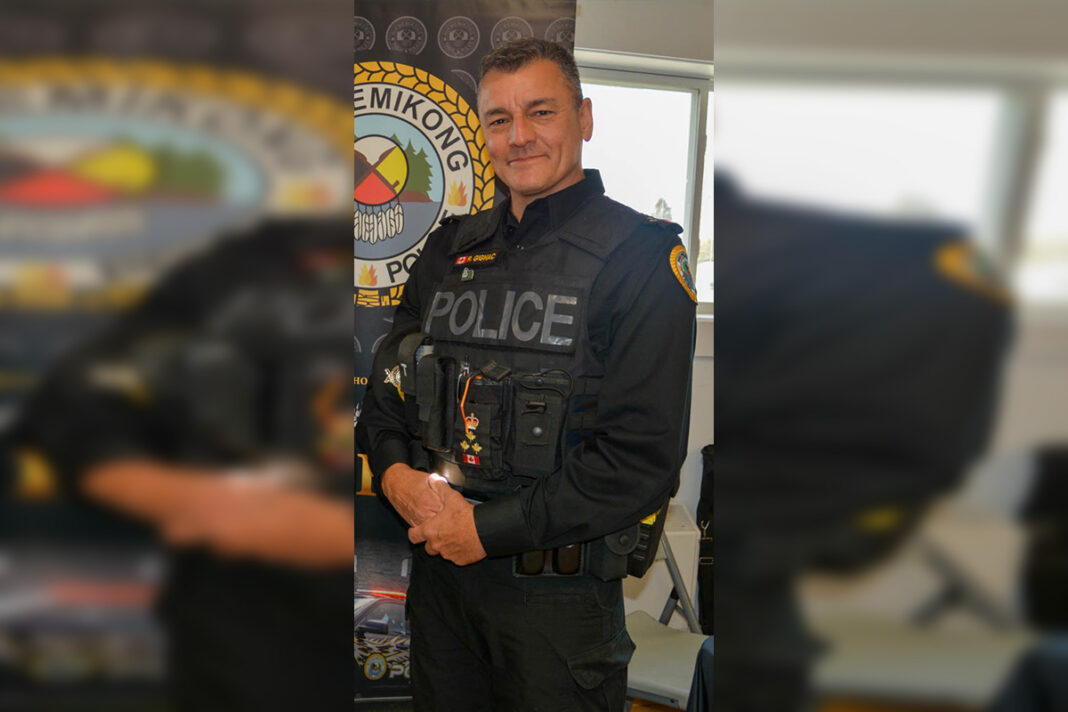WIIKWEMKOONG—The Gignac family’s military legacy is a proud and profound one, etched in decades of service stretching back over a century, and each year, Remembrance Day stands as a poignant time to honor that history. For Chief Ron Gignac of the Wiikwemkoong Police Service, military service runs deep—woven into his upbringing and, now, carried on by the next generation.
Growing up, Police Chief Gignac listened as his father, a Canadian Army veteran, recounted tales of service from the 1950s and early 1960s, and shared stories of Police Chief Gignac’s grandfather, who served in World War II as a medic in the Army Medical Corps. His great-grandfather had also served during World War I, enlisting as a young man and surviving the brutal conditions on the battlefields of France. For young Ron, hearing these stories sparked a determination to follow in his family’s footsteps. “I remember my first Remembrance Day Parade,” he says, recalling a formative moment in 1981 when he was a cadet with the Royal Canadian Army Cadets in St. Catharines, Ontario. The experience left an indelible mark on him.
At the time, St. Catharines was a military hub, and that November parade was a massive affair, teeming with veterans from World War I, World War II and the Korean War. “The entire armory parking lot was filled with veterans in their blue blazers,” Chief Gignac remembers. “We, the Army Cadets, were positioned toward the back, watching this enormous sea of veterans forming up. To see the World War I veterans, many in wheelchairs, leading the parade… it was something else.”
In 1981, even after decades had passed, St. Catharines streets were filled with World War I veterans who had come to honour fallen comrades. Police Chief Gignac recalls being awestruck by the sight of the older soldiers—some leaning on canes, others still proudly marching in uniform. “I was just 14 years old, and watching them, I knew I wanted to serve.” The veterans of the World Wars and the Korean conflict marched in rows that filled the street, each unit representing a different chapter of military history, leading to the cenotaph to pay their respects.
Following that experience, Police Chief Gignac joined the Royal Canadian Army Cadets at the 68th Lincoln and Welland Regiment in 1981 and never looked back. His military career would eventually lead him through deployments to Cyprus for peacekeeping, the Gulf War in Kuwait, and various other international missions. As a combat engineer, he became an expert in explosive ordnance disposal, bridge construction, and other critical fields, often working alongside international forces in high-stakes environments.
Even after moving to a career in law enforcement with the Ontario Provincial Police in 1995, Chief Police Gignac kept a connection to his military roots, serving as a reservist until 1999. Through his decades in service, he says the Remembrance Day parades remained a special event for him—a time to connect with other veterans and honor the sacrifices of friends and family.
As he speaks, Police Chief Gignac doesn’t shy away from the challenges that veterans face, especially the effects of trauma. “Back in my grandfather’s day, they called it ‘shell shock.’ Now we understand it’s PTSD, but it’s something that all first responders and service members face,” he says. For Police Chief Gignac, fostering support systems for veterans and first responders is essential. “Resilience comes in many forms. It’s about mental, emotional, physical, and spiritual health. Sometimes, it’s about just being able to talk to someone who understands.”
His career as a combat engineer took him across the globe, from the peacekeeping missions in Cyprus to the Gulf War and deployments in Iraq and Somalia. Police Chief Gignac’s expertise in explosive ordnance disposal and bridge construction made him invaluable during these tense international missions. “We’d clear minefields, lay bridges, and dispose of unexploded ordnance,” he explains, detailing the precision and mental resilience the role required. For him, the work was about keeping others safe, a mission he’s carried into his role in policing.
Police Chief Gignac is proud to see the tradition carried forward by his two daughters, Jackelyn Buss and Nicolette Clements, both of whom serve in the Royal Canadian Air Force. “It means a lot to my wife and me,” he says with pride. “They chose this on their own, and it’s become part of who they are.”
On Remembrance Day, Police Chief Gignac will again pay tribute, joining veterans, families and young cadets—many of whom are just beginning to understand the significance of military service. For Police Chief Gignac, it’s a reminder of how far his family has come, and of the sacrifices that built the legacy they proudly carry forward. “Service isn’t easy,” he says, reflecting on the challenges his family has faced. “But it’s who we are. And on days like this, we remember why it matters.”






